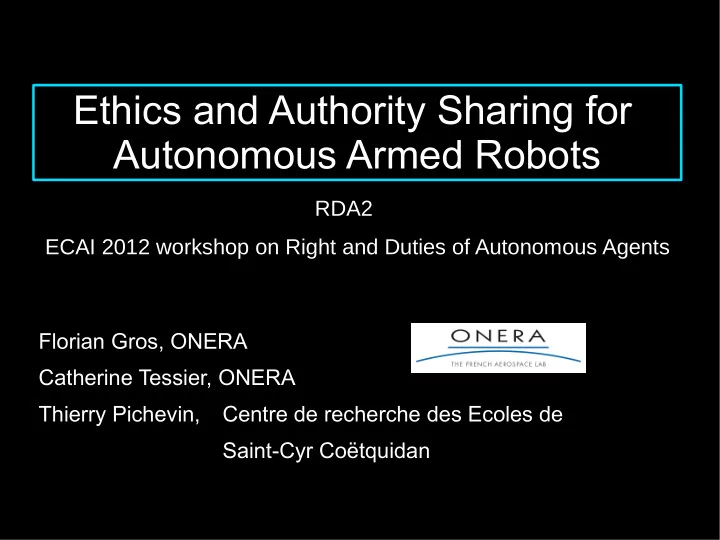

Ethics and Authority Sharing for Autonomous Armed Robots RDA2 ECAI 2012 workshop on Right and Duties of Autonomous Agents Florian Gros, ONERA Catherine Tessier, ONERA Thierry Pichevin, Centre de recherche des Ecoles de Saint-Cyr Coëtquidan
Preliminary notes ✗ Robot = 'Autonomous' armed robot ✗ Difference between : ✗ Morality : rules for action, good/evil evaluation ✗ Ethics : reasoning in case of a conflict or an absence of rules 2
Introduction ✗ Increasing use of 'autonomous' robots in numerous domains ✗ 'Autonomous' robots are supervised by human operators : authority is shared ✗ Our goal : to consider several ethical issues raised by the deployment of robots in the framework of authority sharing between a robot and a human operator 3
Authority sharing ✗ Literature on robot autonomy => omission of the operator or operator considered as a last resort ✗ Authority => robot and operator equally taken in account as agents [Tessier & Dehais, 2012] ✗ Agents can have authority over a resource (weapon, etc.) ✗ Authority conflict : unexpected / misunderstood authority changes [Pizziol, Tessier & Dehais, 2012, this afternoon] ✗ Authority sharing = relationship between agents 4
Our approach ✗ Review ethical questions concerning robots ✗ Consider those questions in the framework of authority sharing ✗ Study authority conflicts related to ethical issues through : ✗ Experimental approach ✗ Scenarios 5
Ethical questions concerning robots - Autonomy ✗ Kant : Categoric imperative and human autonomy of end ✗ Rousseau / Rawls : Contract theory ✗ Operational definition : decisional autonomy of means [Schreckenghost et al., 1998 ; Huang et al., 2005] ✗ Desirability of fully autonomous robots ? 6
Ethical questions concerning robots - Responsibility ✗ Many different approaches ✗ Causal responsibility vs. Moral responsibility (Choice) ✗ Possible leads : ✗ Reduced responsibility (negligence, vicarious liability, slave morality) [Lin et al., 2008] ✗ Treatment [Lokhorst & Van den Hoven, 2012] ✗ Moral status [Abney, 2012 ; Himma, 2007] 7
Ethical questions concerning robots – Moral status and consciousness ✗ Moral status : attributed to conscious beings ✗ Two non-discrimination principles [Bostrom & Yudkowsky, 2011] : ✗ Principle of Substrate Non-Discrimination ✗ Principle of Ontogeny Non-Discrimination ✗ Triage Turing Test [Sparrow, 2004] 8
Ethical questions concerning robots – Ethical reasoning Three different approaches : ✗ Top-down [Ganascia, 2007; Bringsjord & Taylor, 2012] ✗ Bottom-up [Lang, 2002; Harms, 2000] ✗ Hybrid [Arkin, 2007, 2009; Wallach & Allen, 2009; Anderson et al., 2006] 9
Ethical questions concerning robots – Ethical reasoning Top-down Bottom-up ✗ Ethical theory => Set ✗ Development of rules of implementable and ethical abilites rules through learning (consequentialism, + : adaptability, logic-based) optimization + : global, fixed, - : expensive, easily understood untraceable, rules determining a - : frozen, incomplete criterion rules 10
Ethical questions concerning robots – Ethical reasoning Hybrid ✗ Combination of top-down and bottom-up approaches ✗ Most applicable results ✗ Three directions : ✗ Case-based reasoning [McLaren, 2006 ; Anderson et al., 2006] ✗ Virtue ethics [Wallach & Allen, 2009] ✗ Arkin's deliberative / reactive architecture [Arkin, 2007] 11
Ethics and authority sharing ✗ Reminder : Authority sharing => Relationship between agents ✗ Autonomy : more decision-making power through authority taking ✗ Responsibility : ✗ Authority to the operator : robot as a tool, responsibility of the operator ✗ Authority to the robot : treatment, responsibility of the deployer ✗ Contract theory => Specific clauses for agents to respect 12
Ethics and authority sharing ✗ Moral status and consciousness : better situational assessment on the robot's side through human operator 'state' assessment [Regis et al., 2012 ; Pizziol, Dehais & Tessier, 2011] ✗ On-going work : ✗ Ethical reasoning : assistance by the robot in case of ethical conflict ✗ Integration of authority sharing to Arkin's architecture (action evaluation through ethical governor) 13
Scenarios ✗ Goal : to test the robot's compliance with a set of rules of engagement during an authority conflict ✗ Two scenarios designed to simulate a battlefield ✗ Morally difficult situations (hostile crowd, explosive planting) ✗ Production of a morally incorrect behaviour => Robot takes authority => Authority conflict => Solving through correct behaviour 14
Conclusion / Further work ✗ Assess whether : 1)Better performance achieved by a human-robot system : better situation assessment, adaptability, compliance with rules through reasoning and authority sharing 2)Ethical autonomous armed robots : possible with authority sharing ? ✗ Need for an evolution of the legal and philosophical framework 15
Recommend
More recommend